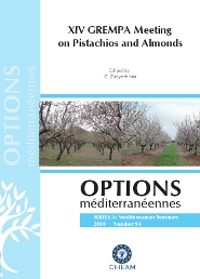| Article précédent | p. 95-100 | Article suivant |
A possible activation of the Sf allele in almond
Self-compatibility has become the primary objective of most almond (Prunus amygdalus Batsch) breeding programmes in order to avoid the problems related to the gametophytic self-incompatibility (GSI) system present in almond, as in other species of the genus Prunus, belonging to the Rosaceae family. Self-incompatibility is a mechanism in flowering plants which prevents self-fertilization and promotes out-crossing. The S locus encodes for ribonucleases expressed in the style (S-RNase) and for F-box proteins expressed in the pollen (SFB). Interactions between both genes are suspected of being involved in determining the specific self pollen and with same haplotype rejection. As this mechanism is still not fully understood, a progeny of 90 seedlings from the cross Vivot (S23Sf?) X Blanquerna (SfSf?) was studied because the microscopic observation of pollen tube growth after self-pollination during several years showed an unexpected self-incompatible behaviour in most seedlings. Although the zymograms from stylar ribonucleases and the PCR products using specific and consensus primers allowed distinguishing the individuals with SI or SC genotype, the expression of the Sf allele was not the same in all cases, as shown by the SI phenotype of many seedlings with a SC genotype, suggesting a possible differential expression of Sf. Cloning and sequencing of the SFBs in the two parents may allow to determine whether they have a different protein expression and also to closely study the pollen-expressed F-box genes in almond.
L'auto-compatibilité est devenue l'objectif prioritaire de la plupart des programmes d'amélioration génétique de l'amandier (Prunus amygdalus Batsch) pour éviter les problèmes liés à la présence du système d'auto-incompatibilité gamétophytique de l'amandier, comme chez d'autres espèces du genre Prunus, appartenant à la famille Rosaceae. L'auto-incompatibilité est un mécanisme des plantes qui empêche leur auto-fertilisation en favorisant le croisement entre les différents génotypes. Le locus S code pour une ribonucléase exprimée dans le style (S-RNase) et aussi pour une protéine exprimée dans le pollen (SFB). Les interactions entre les deux gènes sont suspectées d'être déterminantes du pollen spécifique ainsi que du pollen avec le même haplotype. Comme ce mécanisme n'est pas encore bien compris, une famille de 90 individus provenant du croisement Vivot (S23Sf?) X Blanquerna (SfSf?) a été étudiée parce que l'observation microscopique de la croissance des tubes polliniques après l'autopollinisation pendant plusieurs années a montré un comportement auto-incompatible inattendu chez la plupart des individus. Malgré que les zimogrammes des ribonucléases stylaires et les produits de PCR avec des primers spécifiques et primers consensus ont permis de distinguer les génotypes AI ou AC, l'expression de l'allèle Sf n'est pas toujours la même, comme le montre le phénotype AI chez beaucoup de plantes ayant un génotype AC, suggérant une possible expression différente de Sf. Après clonage et séquençage des SFB des deux parents, il sera possible de déterminer s'il existe des niveaux différents d'expression de protéine et d'étudier les gènes de F-box exprimés chez l'amandier.
- [ Afficher ]
- [ Télécharger ]
- [ Exporter la citation ]
Vous pouvez télécharger la citation au format :
- [ Imprimer ]
-
Mots-clés
AUTOCOMPATIBILITE, AUTOSTERILITE, LOCUS, PRUNUS DULCIS, RIBONUCLEASECiter cet article
Fernández i Martí A., Alonso J.M., Kodad O., Socias i Company R. A possible activation of the Sf allele in almond. In : Zakynthinos G. (ed.). XIV GREMPA Meeting on Pistachios and Almonds. Zaragoza : CIHEAM / FAO / AUA / TEI Kalamatas / NAGREF, 2010. p. 95-100. (Options Méditerranéennes : Série A. Séminaires Méditerranéens; n. 94). 14. GREMPA Meeting on Pistachios and Almonds, 2008/03/30-2008/04/04, Athens (Greece). http://om.ciheam.org/om/pdf/a94/00801289.pdf



